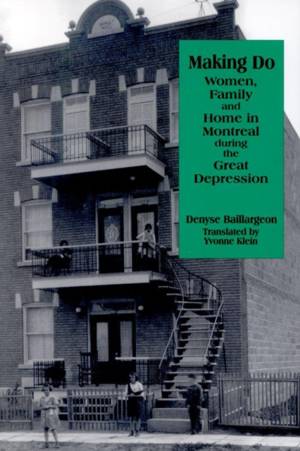
- Afhalen na 1 uur in een winkel met voorraad
- Gratis thuislevering in België vanaf € 30
- Ruim aanbod met 7 miljoen producten
- Afhalen na 1 uur in een winkel met voorraad
- Gratis thuislevering in België vanaf € 30
- Ruim aanbod met 7 miljoen producten
Omschrijving
Life in the Great Depression -- long lines of unemployed, soup kitchens, men riding the rails, public works projects -- these are the graphic images of the Great Depression of the 1930s, popularized by the press and seared into our memories. But outside of a few distinctive stories gathered from the oral and anecdotal writings on strategies used to survive, we know next to nothing about the daily life of the working class during those long and hungry years.
How did the families survive when the principal breadwinner was unemployed? How did they feed, shelter and clothe themselves when relief payments covered barely half of their essential needs? To answer these questions Denyse Baillargeon looks at the contribution of the housewives. By interviewing Montreal francophone women who were already married at the beginning of the 1930s, and by examining their principal responsibilities, she uncovers the alternative strategies these housewives used to counter poverty. Their recollections made it possible to shed light not only on the impact of the economic crisis on their household duties during the Depression but also on their lives from childhood to World War II, and on the living conditions of the working class from which most of them came. This material is all the more valuable because it proceeds from a generation of women that will soon disappear and who have left very little in the way of written evidence behind.
This study, which draws us into the intricate lives of individuals, reveals a previously unexplored dimension of the Depression and shows the importance of considering the domestic sphere for understanding the complete history of the working class.
Specificaties
Betrokkenen
- Auteur(s):
- Uitgeverij:
Inhoud
- Aantal bladzijden:
- 232
- Taal:
- Engels
- Reeks:
- Reeksnummer:
- nr. 1
Eigenschappen
- Productcode (EAN):
- 9780889203266
- Verschijningsdatum:
- 26/10/1999
- Uitvoering:
- Paperback
- Formaat:
- Trade paperback (VS)
- Afmetingen:
- 138 mm x 212 mm
- Gewicht:
- 309 g

Alleen bij Standaard Boekhandel
Beoordelingen
We publiceren alleen reviews die voldoen aan de voorwaarden voor reviews. Bekijk onze voorwaarden voor reviews.











